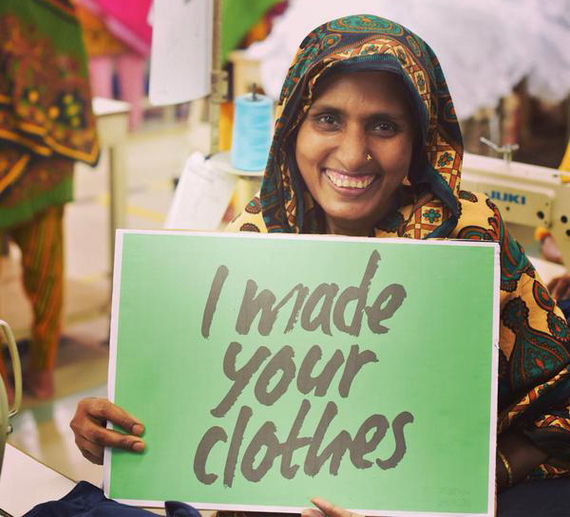
Photocredit: Fashion Revolution
"I love your top! Where's it from?"
A line guaranteed to be followed by some ungainly contortion of the body as we fumble around to fish out scratchy labels tucked in side-seams, or folded away at nape of the neck. As we peer at the lettering so we can deliver a verdict, we inadvertently make visible other small print specificities - not that you'd expect a run-down.
"12% polyester, 75% cotton, 13% elastane. Made in Cambodia".
We probably wouldn't go so far as to imagine the lifespan of our clothes; beginning as pinky-white cotton balls swaying like candyfloss in muddy fields; nor their journey through the gin mills, spinning factories and clattering industrial looms that sort the weft and warp. We probably don't envisage the hands that deftly cut and stitch the cloth, fold, pleat and crimp - and repeat. We don't think about the air miles clocked up as our clothes soar through the clouds and voyage across seas. The silken layers that sit against our skin come to us replete with their own stories. Our wardrobe contents are well-travelled, an international body of clothes with tacit memory.
If our clothes could talk though, those memories would reveal things we probably wouldn't ever be likely to forget. Friday 24 April is a day that hopes to reignite the public's interest in thinking about the provenance of our clothes; the stories which our clothes can never tell, the faces of the often faceless workforce.
It marks the second anniversary of the Rana Plaza factory collapse in the Bangladeshi capital Dhaka, the worst disaster in the history of the clothing industry. One photograph emerged that has since become emblematic of the tragic events that unfurled that day, and the careless commodification of human life that led to the deaths of 1000 workers. Final Embrace, by photographer Shahidul Alam is a snapshot of suffering that has remained embedded in my mind ever since; lodged like a stubborn splinter.
Fashion Revolution Day is a global movement calling for greater transparency in the fashion supply chain, and celebrating those on a journey to create a more ethical and sustainable future for fashion. Its social media campaign hopes to turn the thoughts of shoppers to the producers and makers many miles away, and inspire people to ask clothing brands one simple question: who made my clothes?
The campaign has garnered plenty of celebrity support, attracting big-name stars such as model Lily Cole, Eco-Age Founder Livia Firth and chef Melissa Hemsley, and has sparked participation in 71 countries.
To get involved, Fashion Revolution is asking you to take three simple steps in the move to raise awareness of the provenance of your clothes - and support the communities and individuals that produce our fashion:
1. Take a selfie showing your label. You could turn your t-shirt inside out - a la 'Livia Firth' to make more of a statement.
2. Upload your photo to social media tagging the brand with the message 'I want to thank the people who made my clothes @brand #whomademyclothes?'
3. Make the message louder by nominating three friends to do the same
In the face of those who believe that responsibility lies with couldn't-care-less retailers and multinational corporations, we must remain positive. Turning a blind eye to the problems doesn't dissolve our accountability - and I, for one, don't want to be prettily attired at any cost. That's why Fashion Revolution is asking us to bottle our curiosity, and keep it within grasp. We can choose to look at the social responsibility pages of our favourite high street retailers. We can lend our support, donate or fundraise for initiatives such as Labour Behind the Label. We can reject the throwaway culture and care for our clothes more - or spend a little more on quality items that will stand the test of time. Or we can recycle, swap, source locally, or delve into charity shops for some ethical bargains. Because clothes are powerful signifiers; documentation, if you will, that communicates our identity like a visual passport. They remain an expression of our personal beliefs, tastes and choices. By participating in Fashion Revolution Day, we can choose to show we care about the welfare of workers, the origins of our clothes, and the future of our fashion.
Ultimately, the aim is to create social dialogue. Let the thrum of sewing machines and the clatter of looms thousands of miles away be matched by people's voices. Consumer conscience does have the power to change things, because it leads to consumer pressure - a real force for change.